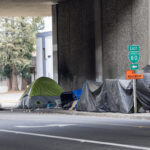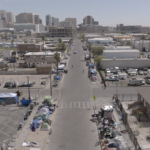Goldwater Urges U.S. Supreme Court to Take Up Homelessness Case
The Goldwater Institute filed a brief in the U.S. Supreme Court yesterday urging the justices to review a Ninth Circuit ruling that—at least according to Phoenix city leaders—makes it harder for local governments to address the ongoing homelessness crisis. In its brief, we argue that the Supreme Court must overturn the Ninth Circuit’s ruling in order to take away Phoenix’s excuse for refusing to enforce the law in “The Zone,” the sprawling encampment of hundreds of homeless people in downtown Phoenix, which is riddled with violent crime, public drug use, and social instability.
The case concerns the city of Grants Pass, Oregon, which the Ninth Circuit said violated the U.S. Constitution’s Cruel and Unusual Punishment Clause by arresting people for sleeping on the streets. Relying on precedents that bar the government from punishing people for so-called status crimes—that is, laws that punish someone for who he is, rather than for what he’s doing—the Ninth Circuit declared that the Bill of Rights forbids cities from arresting people for camping on the streets, in any situation in which there are too few beds available in homeless shelters to house such people. The court’s theory was that when no such beds are available, sleeping on the streets is “involuntary,” and therefore not something the government may rightly penalize.
The Grants Pass lawsuit has been going on for years now, and Phoenix leaders have repeatedly pointed to that theory as a reason for their refusal to clean up the massive open-air homeless shelter that the city is currently operating in the streets. The Zone is the subject of an ongoing state-court lawsuit by property and business owners whose buildings have been damaged and employees threatened by Zone residents. (We’ve filed several friend-of-the-court briefs in support of the property and business owners’ assertions.)
It’s clearly a public nuisance—a state court judge has already said so—but city officials have repeatedly told the judge that they can do nothing about it because federal rulings such as the Grants Pass case tie their hands. That isn’t really true, as we explain in our brief, but it’s a convenient excuse for the city—and it’s certainly true that the Grants Pass case makes little sense. A person isn’t “involuntarily” sleeping on the streets just because the government hasn’t given him a bed—any more than someone who drives home drunk from a bar is “involuntarily” driving under the influence just because the government didn’t hire him an Uber. A remarkable example of the irrationality of the Grants Pass ruling can be seen in the federal lawsuit involving The Zone: in that case, the plaintiffs include a man who has been homeless for over two decades, but who still claims to be “involuntarily” sleeping on the streets pursuant to the Grants Pass decision.
That decision, in short, confuses voluntary with involuntary actions because it automatically assumes that a shortage of beds in a city’s homeless shelters renders a person “involuntarily” homeless—when that’s not what “involuntary” means. “Involuntary” means (in a phrase the Grants Pass ruling itself actually quoted), the “unavoidable consequences of being human.” While that might apply to someone who falls asleep on a park bench from sheer exhaustion, it certainly cannot apply to people who have chosen to live on the streets for two decades.
Rulings like the Grants Pass case—and the Martin v. Boise decision before it—presume that people are incapable of taking responsibility for their lives without government aid. And that basic assumption gives local governments an all-too-convenient way to pass the buck with regard to the homelessness problem. That, in turn, has led to a homeless crisis in many cities, particularly in the west. The Zone is only the most prominent example. And the victims aren’t just the homeless themselves, who deserve better than to be left on the streets in 120-degree Phoenix summers—but also the innocent business and property owners in the area, who didn’t cause the homelessness problem, and don’t deserve to have their land and livelihoods ruined through a combination of bad legal reasoning and feckless irresponsibility.
And city officials nationwide have made it clear that the only thing that will change their minds is action by the U.S. Supreme Court.
You can read our brief here and learn more about The Zone crisis here.
Timothy Sandefur is the Vice President for Legal Affairs at the Goldwater Institute.
Get Connected to Goldwater
Sign up for the latest news, event updates, and more.
Recommended Blogs
Constitutional Rights
Let Tennessee Developers Pay for Third-Party Inspectors so They Can Build More Housing
by Brian NormanConstitutional Rights
Supreme Court Should Overrule Ninth Circuit’s Disastrous Homelessness Rule
by Timothy Sandefur
Donate Now
Help all Americans live freer, happier lives. Join the Goldwater Institute as we defend and strengthen freedom in all 50 states.
Donate NowSince 1988, the Goldwater Institute has been in the liberty business — defending and promoting freedom, and achieving more than 400 victories in all 50 states. Donate today to help support our mission.

We Protect Your Rights
Our attorneys defend individual rights and protect those who cannot protect themselves.
Need Help? Submit a case.






